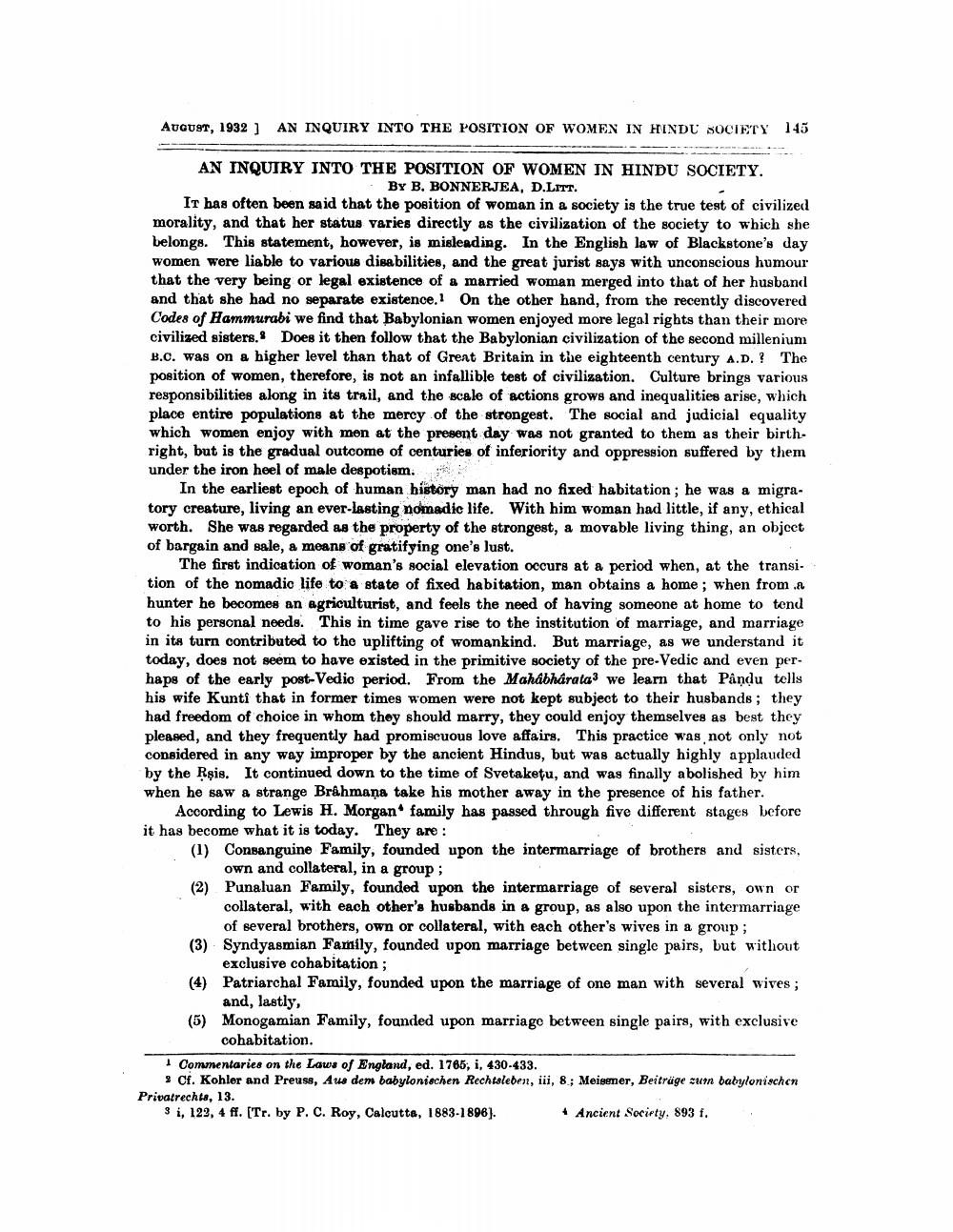________________
AUGUST, 1932] AN INQUIRY INTO THE POSITION OF WOMEN IN HINDU SOCIETY 145
AN INQUIRY INTO THE POSITION OF WOMEN IN HINDU SOCIETY.
BY B. BONNERJEA, D.LITT. It has often been said that the position of woman in a society is the true test of civilized morality, and that her status varies directly as the civilization of the society to which she belongs. This statement, however, is misleading. In the English law of Blackstone's day women were liable to various disabilities, and the great jurist says with unconscious humour that the very being or legal existence of a married woman merged into that of her husband and that she had no separate existence. On the other hand, from the recently discovered Codes of Hammurabi we find that Babylonian women enjoyed more legal rights than their more civilized sisters. Does it then follow that the Babylonian civilization of the second millenium B.C. was on a higher level than that of Great Britain in the eighteenth century A.D.? The position of women, therefore, is not an infallible test of civilization. Culture brings various responsibilities along in its trail, and the scale of actions grows and inequalities arise, which place entire populations at the mercy of the strongest. The social and judicial equality which women enjoy with men at the present day was not granted to them as their birthright, but is the gradual outcome of centuries of inferiority and oppression suffered by them under the iron heel of male despotism.
In the earliest epoch of human history man had no fixed habitation; he was a migratory creature, living an ever-lasting nomadic life. With him woman had little, if any, ethical worth. She was regarded as the property of the strongest, a movable living thing, an object of bargain and sale, a means of gratifying one's lust.
The first indication of woman's social elevation occurs at a period when, at the transi. tion of the nomadio life to a state of fixed habitation, man obtains a home; when from a hunter he becomes an agriculturist, and feels the need of having someone at home to tend to his personal needs. This in time gave rise to the institution of marriage, and marriage in its turn contributed to the uplifting of womankind. But marriage, as we understand it today, does not seem to have existed in the primitive society of the pre-Vedic and even perhaps of the early post-Vedio period. From the Mahabharata3 we learn that Pandu tells his wife Kunti that in former times women were not kept subject to their husbands; they had freedom of choice in whom they should marry, they could enjoy themselves as best they pleased, and they frequently had promiscuous love affairs. This practice was not only not considered in any way improper by the ancient Hindus, but was actually highly applauded by the Rşis. It continued down to the time of Svetaketu, and was finally abolished by him when he saw a strange Brahmana take his mother away in the presence of his father.
According to Lewis H. Morgan family has passed through five different stages before it has become what it is today. They are :
(1) Consanguine Family, founded upon the intermarriage of brothers and sisters,
own and collateral, in a group; (2) Punaluan Family, founded upon the intermarriage of several sisters, own or
collateral, with each other's husbands in a group, as also upon the intermarriage
of several brothers, own or collateral, with each other's wives in a group; (3) Syndyasmian Family, founded upon marriage between single pairs, but without
exclusive cohabitation; (4) Patriarchal Family, founded upon the marriage of one man with several wives;
and, lastly, (5) Monogamian Family, founded upon marriage between single pairs, with exclusive
cohabitation.
Commentaries on the Laws of England, ed. 1765, i, 430-433.
> Cf. Kohler and Preuss, Aw dem babylonischen Rechtsleben, iii, 8; Meigener, Beiträge cum babylonischen Privatrechts, 13.
31, 122, 4 ff. (Tr. by P. C. Roy, Calcutta, 1883-1896). + Ancient Society. 893 f.




